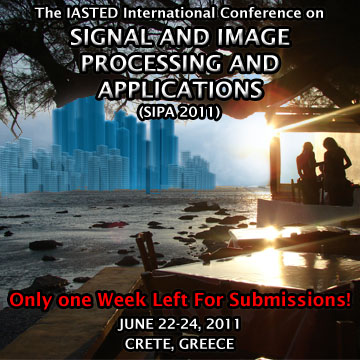11-16 April, 2011
Ford College and Loughborough University, U.K.
www.multimediasignalprocessing.com <http://pro.expressemail.in/link.php?M=1048308&N=874&L=112&F=H> [Event Website]
EARLY REGISTRATION DEADLINE: 5th February, 2011 ... Register Now !
This is an excellent opportunity to attend a fully residential course to learn more about Computer Vision and Signal Processing from some of the world's renowned speakers. The space on this event is limited and discounted fee early bird registration deadline is 10 December, so please register early. Please follow these links:
http://www.multimediasignalprocessing.com/school/programme <http://pro.expressemail.in/link.php?M=1048308&N=874&L=113&F=H> [Programme]
http://www.multimediasignalprocessing.com/school/speakers <http://pro.expressemail.in/link.php?M=1048308&N=874&L=110&F=H> [Speakers]
http://www.multimediasignalprocessing.com/school/register <http://pro.expressemail.in/link.php?M=1048308&N=874&L=111&F=H> [Register]
A detailed programme is enclosed below.
PROGRAMME
11 April, 2011 (9 a.m.- 6 p.m.)
Theme: Computational Signal Processing
“Statistical and Probabilistic Foundations”, Prof. Richard Everson, University of Exeter, UK “Independent Components Analysis”, Prof. Richard Everson, University of Exeter, UK “Multimodal Source Separation”, Prof. Jonathan Chambers, Loughborough University,UK “Multi-scale Signal Processing”, Prof. Fionn Murtagh, Royal Holloway, UK
12 April, 2011 (9 a.m.- 6 p.m.)
Theme: Signal and Object Tracking
“Particle Filters”, Prof. Simon Godsill, University of Cambridge, UK “Hidden Markov Models”, Dr. Philip Jackson, University of Surrey, UK “Video Tracking: An Overview”, Prof. Andrea Cavallaro, Queen Mary University, UK “Object Localisation and Tracking”, Dr. Ian Reid, University of Oxford, UK
13 April, 2011 (9 a.m.- 6 p.m.)
Exhibition at Ford College
Poster presentation by particpants- best poster prize sponsored by Springer Display of products and services by leading companies working in Multimedia Signal Processing
Plenary speeches
“Security Printing and Imaging”, Stephen Pollard, Hewlett Packard Labs, UK “Convolutional Neural Networks for Facial Image Analysis”, Christophe Garcia, France Telecom, France
14 April, 2011 (9 a.m.- 6 p.m.)
Theme: Machine Vision
“Low Level Vision”, Prof. Roy Davies, Royal Holloway, UK “3D Imaging and Interpretation”, Prof. Edwin Hancock, University of York, UK “Embedded Vision Systems”, Mr. Michael Tusch, Apical Imaging, UK “Machine Vision Toolkits”, Mr. Chris Baldwin, Stemmer Imaging, UK “3D Machine Vision Toolkits”, Dr. Julie Busby, Multipix Imaging, UK
15 April, 2011 (9 a.m.- 7 p.m.)
Theme: Image and Video Understanding
“Colour Perception and Image Analysis”, Prof. Maria Petrou, Imperial College, UK “Object Detection and Recognition”, Prof. Andrew Zisserman, University of Oxford, UK “Multiple View Geometry”, Prof. Marc Pollefeys, ETH, Switzerland “3D Localisation and Mapping”, Dr. Andrew Calway, University of Bristol, UK
16 April, 2011 (9 a.m.- 5 p.m.)
Theme: Multimedia Data Management
“Multimedia Indexing and Retrieval”, Prof. Stefan Ruger, Open University, UK “Video Coding”, Prof. Mohammed Ghanbari, University of Essex, UK “Learning and Performance Evaluation”, Prof. Sameer Singh, Loughborough University, UK











